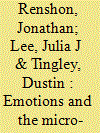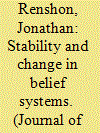|
|
|
Sort Order |
|
|
|
Items / Page
|
|
|
|
|
|
|
| Srl | Item |
| 1 |
ID:
086250


|
|
|
|
|
| Publication |
2009.
|
| Summary/Abstract |
How states assess the capabilities of their adversaries and rivals is of paramount importance to the theory and practice of international relations. This paper presents a framework for understanding why states overestimate the capabilities of their adversaries. Three types of overestimation are presented, consisting of conscious/rational, erroneous and biased overestimation. In order to demonstrate the phenomenon of biased overestimation in international politics, the case of the 'Missile Gap' (1957-61) controversy in the United States is examined.
|
|
|
|
|
|
|
|
|
|
|
|
|
|
|
|
| 2 |
ID:
153561


|
|
|
|
|
| Summary/Abstract |
While emotions are widely regarded as integral to the “behavioral approach” to International Relations (IR), a host of fundamental problems have delayed the integration of affective influences into traditional models of IR. We aim to integrate affect by focusing on commitment problems, a body of work that contains strong theoretical predictions about how individual decision makers will and should act. Across two lab experiments, we use a novel experimental protocol that includes a psychophysiological measure of emotional arousal (skin conductance reactivity) to study how individuals react to changes in bargaining power. While we find support for one key pillar of IR theory—individuals do reject offers when they expect the opponent's power to increase—we also find that physiological arousal tampers with individuals’ ability to think strategically in the manner predicted by canonical models. Our follow-up experiment mimics the elements of institutional solutions to commitment problems and finds support for their efficacy on the individual level. Our novel findings suggest that when individuals face large power shifts, emotional arousal short-circuits their ability to “think forward and induct backwards,” suggesting that emotionally aroused individuals are less prone to commitment problems.
|
|
|
|
|
|
|
|
|
|
|
|
|
|
|
|
| 3 |
ID:
140353


|
|
|
|
|
| Summary/Abstract |
Status has long been implicated as a critical value of states and leaders in international politics. However, decades of research on the link between status and conflict have yielded divergent findings, and little evidence of a causal relationship. I attempt to resolve this impasse by shifting the focus from status to relative status concerns in building a theory of status from the ground up, beginning with its behavioral microfoundations. I build on and extend previous work through an experimental study of status threats and the escalation of commitment, operationalized here as a new behavioral escalation task using real financial incentives and framed around a narrative of war and peace. I utilize a unique sample of high-profile political and military leaders from the Senior Executive Fellow (SEF) program at the Harvard Kennedy School, as well as a group of demographically matched control subjects, allowing me to evaluate the moderating effect of power on status concerns while also addressing typical concerns about external validity in IR experiments. I find strong evidence that the fear of losing status impedes decision making and increases the tendency to “throw good money after bad,” but that power aids decision making by buffering high-power subjects against the worst effects of status loss.
|
|
|
|
|
|
|
|
|
|
|
|
|
|
|
|
| 4 |
ID:
089620


|
|
|
|
|
| Publication |
2009.
|
| Summary/Abstract |
The Cuban Missile Crisis is by this point well known to all scholars of international politics. Yet, although it has yielded countless lessons over the years, one critical aspect of the case has remained unexamined: the failure of estimation prior to the crisis that led US officials to discount the possibility of a missile deployment in Cuba. This article re-examines US intelligence estimates of the Soviet Union prior to the Cuban Missile Crisis in light of the concept of 'mirroring risk', introduced in this article. I present a framework for understanding a class of intelligence failures that are caused by the mis-assessment of how an adversary frames a decision and the risks that they are willing to take. I also present a new two-stage process for understanding how individuals assess the risk-propensity of adversaries in international politics.
|
|
|
|
|
|
|
|
|
|
|
|
|
|
|
|
| 5 |
ID:
137060


|
|
|
|
|
| Summary/Abstract |
Are democracies better at winning wars and militarized disputes? Is there an advantage associated with initiating a war or dispute? Noting that pairwise contest data are the norm in applied research, we motivate a straightforward Bradley–Terry statistical model for these problems from first principles, which will allow for a closer integration of theoretical and statistical practice for scholars of international relations. The essence of this approach is that we learn about the latent abilities of states from observing conflict outcomes between them. We demonstrate the novelty and appeal of this setup with reference to previous attempts to capture estimands of interest and show that for many questions of concern—especially regarding “democratic effectiveness” and “initiation effects”—our approach may be preferred on theoretical and statistical grounds. The evidence we find only partially supports the ideas of “democratic triumphalists”: democracy aids effectiveness, but only in certain contexts (while in others it actually impairs fighting ability). We also provide estimates of possible “initiation effects,” and show that moving first seems to carry little advantage in interstate wars, but a substantial one in lower-level disputes.
|
|
|
|
|
|
|
|
|
|
|
|
|
|
|
|
| 6 |
ID:
084027


|
|
|
|
|
| Publication |
2008.
|
| Summary/Abstract |
Cognitive frameworks and belief systems are the primary lenses through which presidents view the world. Two important questions are whether these beliefs ever change significantly, and if so, what causes these changes? This article develops empirical data on the strategic and operational beliefs of President George W. Bush (GWB) as a means of examining the theoretical basis for how and why core beliefs change. The author analyzes the foreign policy operational code of President Bush in four separate phases of his political career: the immediate prepresidential phase; his nine months in office prior to September 11, 2001; the six months immediately following the 9/11 terrorist attacks; and his last year in office as a second-term president. The results of this article allow us to address several recurring questions that concern the Bush administration and presidents' belief systems and decision making. They challenge traditional interpretations of the Bush presidency and provide some insights into the causal mechanisms that underlie belief change.
|
|
|
|
|
|
|
|
|
|
|
|
|
|
|
|
| 7 |
ID:
147549


|
|
|
|
|
| Summary/Abstract |
Despite widespread agreement that status matters, there is relatively little in the way of focused research on how and when it matters. Relying on the assumption that it “matters” has provided few extant theories of variation in states’ concern for status and little understanding of its specific implications for international conflict. I introduce a theory of status dissatisfaction (SD) that clarifies who forms the basis for status comparisons in world politics, when status concerns should be paramount, and how they are linked to international conflict. I demonstrate the viability of conflict as a strategy for status enhancement: both initiation and victory bring substantial status benefits over both five- and ten-year periods. Using a new, network-based measure of international status, I demonstrate that status deficits are significantly associated with an increased probability of war and militarized interstate dispute (MID) initiation. Even internationally, status is local: I use “community detection” algorithms to recover status communities and show that deficits within those communities are particularly salient for states and leaders.
|
|
|
|
|
|
|
|
|
|
|
|
|
|
|
|
| 8 |
ID:
073910


|
|
|
|
|
| Publication |
Westport, Praeger Security International, 2006.
|
| Description |
xiii, 221p.
|
| Standard Number |
0275990850
|
|
|
|
|
|
|
|
|
|
|
|
Copies: C:1/I:0,R:0,Q:0
Circulation
| Accession# | Call# | Current Location | Status | Policy | Location |
| 051687 | 355.0275/REN 051687 | Main | On Shelf | General | |
|
|
|
|
|
|
|
|
|